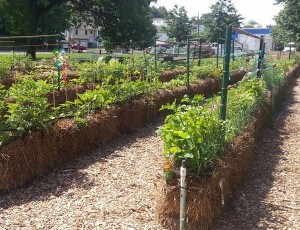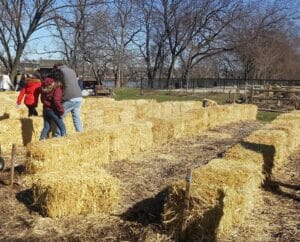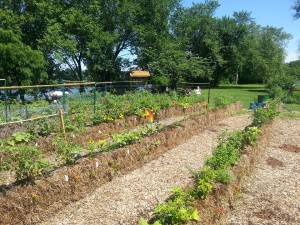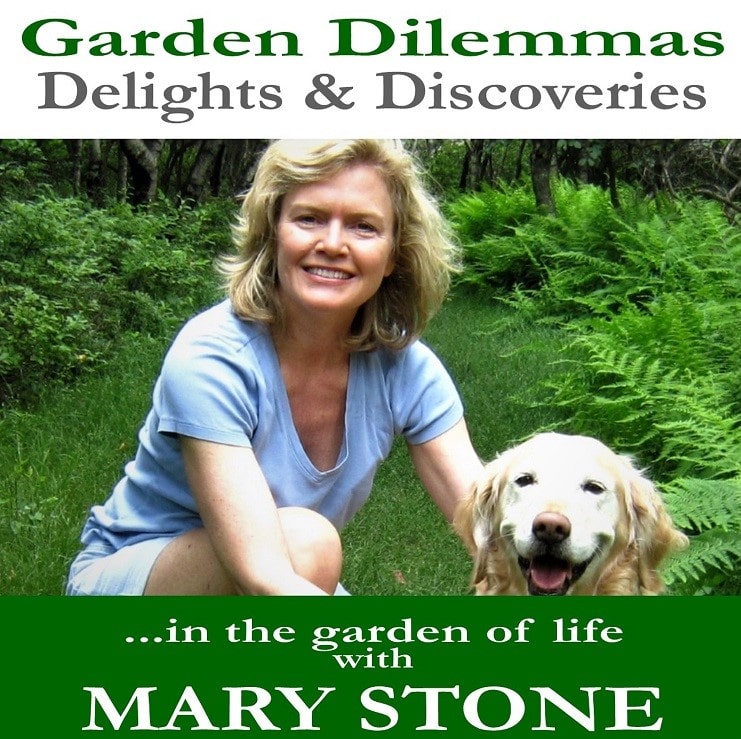Hello, fellow lovers of all things green,
As we approach the end of winter, we begin to think about vegetable gardens. I hope to have an attractive fence this year rather than my workaround stakes and deer netting. Not so pretty, but the veggies are. In addition to the No-Till Gardening Technique, which I adapted thanks to Patty Doell (story link below), there’s another way to forgo tilling and weeding using straw bales.

Kearny Community Garden
Kearny Community Garden uses the Straw Bale Gardening
I knew little about Straw Bale Gardening until I met Peg and Ed, entrenched volunteers of the Kearny Community Garden along the Passaic River in NJ, not far from Manhattan. Peg, a retired 6th-grade teacher of 52 years, is still teaching, but now her students are gardeners from age 8 to 93. She explained Straw Bale Gardens by Joel Karsten is her ‘textbook.’
While a trend in urban areas, the raised bed technique works for folks with little space, difficult rocky or heavy clay soil, and those with lousy backs or who garden in a chair. Don’t confuse hay with straw, though; beware of mislabeling too.
Be sure to use Straw versus Hay.
Hay is the entire harvested plant, including the seed heads, while straw is the plant stalk left behind after the seed heads are removed. A lawn will sprout from your bale if you inadvertently use hay bales. And use organically grown straw to be free of pesticides.
When I met Peg and Ed nine years ago, they had 62 spots with five bales each at a modest cost per season that quickly sold out. I emailed the Kearney Community Garden via their Facebook page and hoped to hear back for updates, but I was excited to see they are still using the straw bale technique.

Volunteers set up the Straw Bales in late March
How to Prep the Straw Bales Before Planting
They prep the bales before planting by watering fertilizer into them for about three weeks. Peg says they use Cheep Cheep by North Country Organics. Made of dehydrated poultry litter, as the name implies, Cheep Cheep 4-3-3 (nitrogen- phosphate-potash) is reasonably priced and approved for use in organic farming. It releases slowly and provides other essential secondary nutrients.

Kearny Community Garden
Each bale gets sixteen and a half cups of the stuff. That’s over 5,000 cups over the 310 bales! The bales then decompose to the point that they will support plant growth, and the continued decomposition provides nutrients throughout the growing season.
“We want our garden to be a bridge for all the different groups in our community.” Their Facebook page said, “Regardless of the language we speak, we can all get together around food. Everyone and anyone is welcome.”
United as one. Imagine that.
Digging further, I found an article about the Pros and Cons of Community Gardening. The pros are fresh produce for less money, knowing the origin of your food, and building a community of gardeners. Plus, gardening is a stress-reducing activity for your body and mind.
But there could be cons. Bonnie Grant writes, “There are those who want the produce for themselves and will stoop to stealing your perfect tomatoes. Theft of tools is also common, as is vandalism. And not everyone is going to agree to the same rules, which can lead to arguments. But there are many pros of having a community garden that far outweighs any cons. So, join your local community garden today.”
When you think about it, if we live by our true selves, of kindness and concern for the well-being of all, including nature, there wouldn’t be a need for rules. And while they exist, rules will become less relevant, maybe someday irrelevant, if we live from our hearts. Imagine that. It makes me think of the song Imagine by John Lennon—the chorus—”You may say I’m a dreamer, but I’m not the only one. I hope someday you’ll join us, and the world will be as one.” What a beautiful chorus.
Garden Dilemmas? AskMaryStone@gmail.com and your favorite Podcast App.
There is more to the story in the Garden Dilemmas Podcast (@10 soothing minutes):
Related Stories and Helpful Links:
Kearny Community Garden’s Facebook Page
No-till Gardening – Blog Post. Podcast Ep 28. Three Sisters, No-Till Gardening
Vegetable Gardening Basics and Starting an Organic Garden



Truly inspirational……….